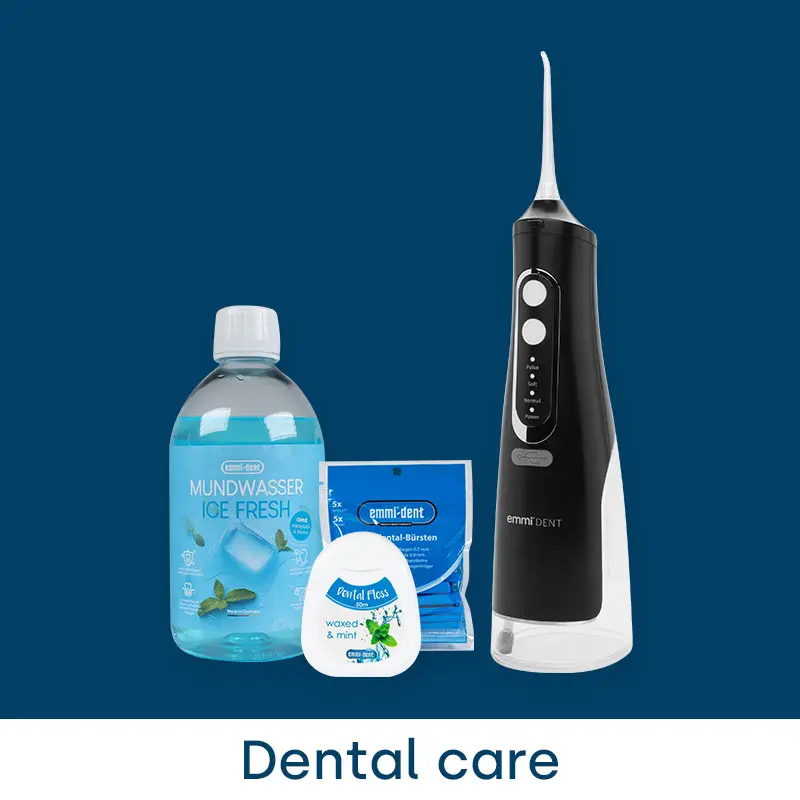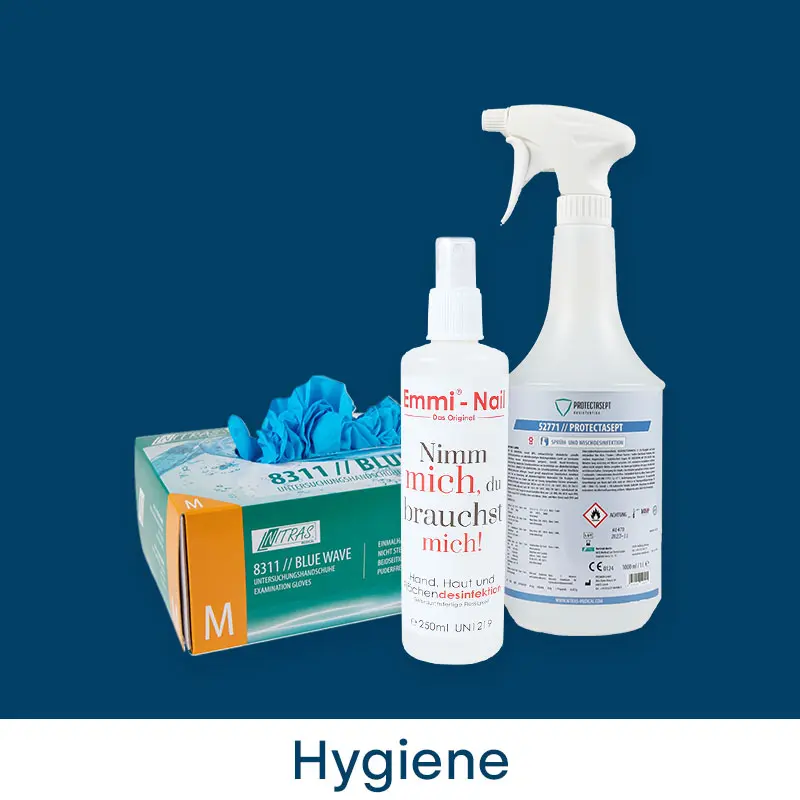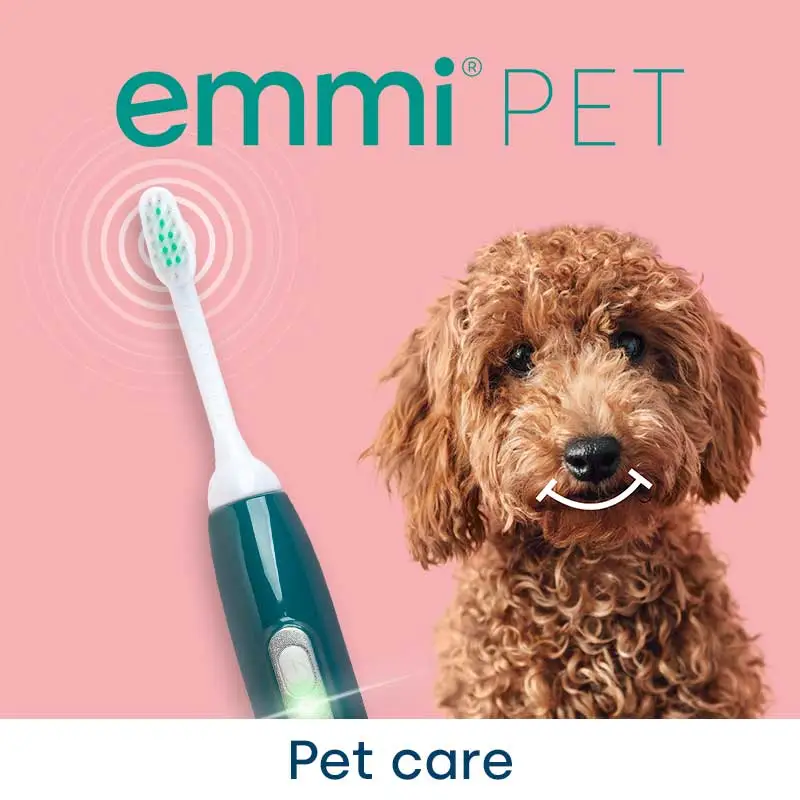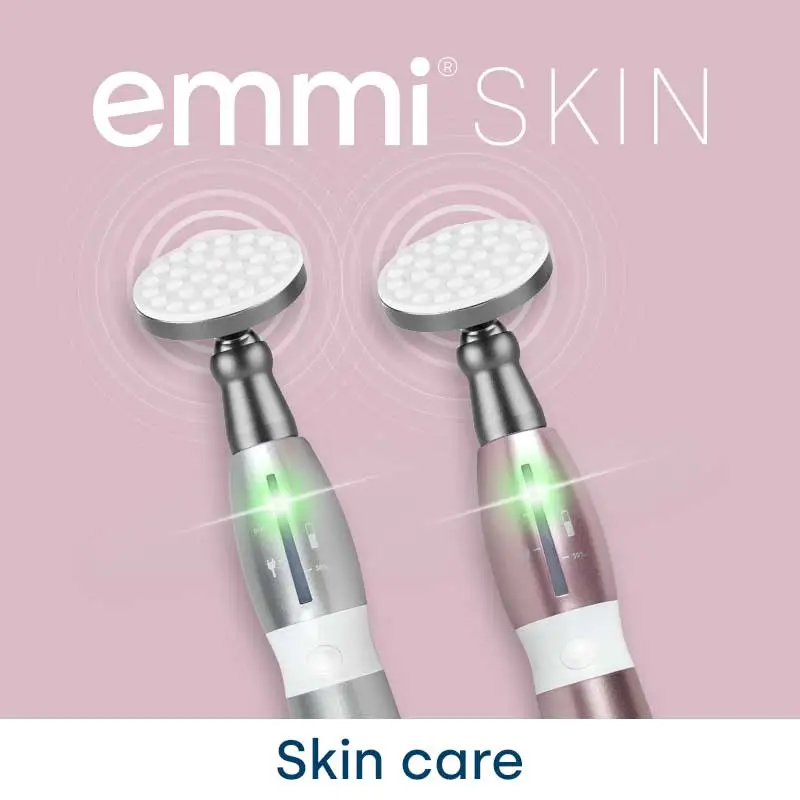
Oral health is an essential part of your overall well-being. What you eat and drink has a direct impact on your teeth and gums. A balanced diet can help prevent tooth decay and gum disease and promote oral health. In this article, you will learn how a healthy diet supports your oral health and which foods are particularly beneficial or harmful. We also look at the benefits of the emmi-dent ultrasonic toothbrush, which helps you to achieve optimum oral hygiene.
How your diet affects your oral health
Your nutrition plays a crucial role in maintaining oral health. It's important to understand which foods are beneficial and which should be avoided to maintain the health of your teeth and gums.
1. effect of sugar and acidic foods
Sugar promotes the growth of bacteria in the mouth that produce acids and attack tooth enamel. These bacteria turn sugar into acids, which erode tooth enamel and can cause tooth decay. Sugary snacks and drinks consumed between meals are particularly dangerous, as they are exposed to the teeth for longer.
Acid foods and drinks, such as citrus fruits and soft drinks, can also erode tooth enamel and lead to tooth sensitivity. This combination of sugar and acid can severely damage your teeth if you don't take the right precautions.
It is important to limit the consumption of these foods and to rinse your mouth with water after eating them to neutralise the acids.
2. role of vitamins and minerals
Vitamins and minerals such as calcium, vitamin D and vitamin C are essential for dental health. Calcium strengthens tooth enamel and ensures strong bones, while vitamin D supports the absorption of calcium in the body. Vitamin C promotes gum health and helps heal wounds. An adequate supply of these nutrients is crucial for maintaining strong and healthy teeth.
Foods such as dairy products, green leafy vegetables and fortified foods are good sources of calcium and vitamin D, while citrus fruits, berries and green vegetables are rich in vitamin C.
These nutrients not only contribute to dental health, but also to the general health of your body.
3. influence of hydration on your oral health
Sufficient fluid intake is important to promote saliva production. Saliva plays a crucial role in neutralising acids in the mouth, removing food debris and fighting bacteria. It is a natural protective mechanism of your body that helps to maintain your oral health.
Make sure you drink enough water, especially after eating sugary or acidic foods. Water helps to neutralise acids and protect your teeth.
Drink at least eight glasses of water a day to ensure optimal saliva production and oral health.
By paying attention to your diet and making sure you get enough vitamins and minerals, you can significantly improve your dental health. Avoid sugary and acidic foods and make sure you stay hydrated to protect your teeth and gums. Remember that a good diet not only promotes your oral health, but also supports your general well-being.
Important nutrients for healthy teeth and gums
To optimally support your oral health, it is crucial to ensure an adequate intake of certain nutrients. These nutrients play a key role in maintaining strong teeth and healthy gums.
Calcium and vitamin D
Calcium strengthens teeth and bones, while Vitamin D aids the absorption of calcium in the body. Without enough calcium, your teeth and bones can become brittle and more susceptible to damage. Vitamin D is equally important as it ensures that calcium is effectively incorporated into the bones and teeth.
- Calcium-rich foods: Dairy products such as milk, cheese and yoghurt are excellent sources of calcium. Green leafy vegetables such as spinach and kale as well as fortified foods such as certain juices and cereals also contain calcium.
- Vitamin D sources: You can get vitamin D by eating fatty fish such as salmon, mackerel and tuna, eggs and fortified foods. Sunlight is also an important source of vitamin D.
These nutrients play a key role in maintaining strong teeth and healthy gums. Without adequate calcium and vitamin D, your teeth and gums can be more susceptible to disease and damage.
Vitamin C
Vitamin C promotes gum health and helps heal wounds. It supports the production of collagen, which is essential for gum tissue. A lack of vitamin C can lead to gum problems such as bleeding gums and inflammation.
- Vitamin C sources: Citrus fruits such as oranges, grapefruits and lemons are rich in vitamin C. Berries such as strawberries and raspberries and green vegetables such as broccoli and peppers are also excellent sources.
Sufficient vitamin C levels help to prevent gum inflammation and support the healing of the gums. This keeps your gums healthy and resilient.
Phosphate and magnesium
Phosphate and magnesium are two other minerals that are very important for dental health. They contribute to the strength of teeth and play an important role in the mineralisation of tooth enamel, the protective outer layer of your teeth.
- Sources of phosphate: Nuts, seeds and wholemeal products are rich in phosphate. Meat, fish and dairy products also provide this important mineral.
- Magnesium sources: You can find magnesium in nuts, seeds, wholemeal products and green leafy vegetables.
These minerals support the structure of your teeth and help to strengthen the enamel. A deficiency can weaken the teeth and make them more susceptible to tooth decay and other damage.
Omega-3 fatty acids
Omega-3 fatty acids have anti-inflammatory properties and promote gum health. These healthy fats can help reduce gum inflammation and improve overall oral health.
- Omega-3 sources: Fatty fish such as salmon, mackerel and herring, linseed, chia seeds and walnuts are rich in omega-3 fatty acids.
By incorporating omega-3 fatty acids into your diet, you can reduce the inflammatory response in your gums and promote gum health. This helps to prevent gum disease and improve overall oral health.
A balanced diet rich in these nutrients plays a crucial role in the health of your teeth and gums. Make sure to include these nutrients in your diet regularly to maintain a bright and healthy smile.
Nutrition tips for optimal oral health
To make it easier for you to switch to a healthy diet, we have put together the 4 most important nutrition tips that can help you improve your oral health:
- Low-sugar diet: Reduce your consumption of sugary foods and drinks to minimise the risk of tooth decay. Sugar is the main cause of tooth decay as it feeds the bacteria in the mouth that produce acids and attack tooth enamel.
- Avoid acidic foods and drinks: Limit your intake of acidic foods and drinks to protect your tooth enamel. These can erode tooth enamel and lead to sensitive teeth.
- Include tooth-healthy foods: Incorporate foods rich in calcium, vitamins and minerals into your diet to support the health of your teeth and gums. Foods such as dairy products, green leafy vegetables and fish are particularly beneficial.
- Importance of regular meals: Regular meals help to promote salivation and reduce the risk of tooth decay. Salivation helps to flush food debris and bacteria from the mouth, reducing the risk of tooth decay.
5 top foods that promote oral health
Certain foods can be particularly beneficial for oral health. They provide essential nutrients and support your mouth's natural cleaning and protective mechanisms. Here are the top 5 foods that promote your oral health:
1. dairy products
Milk, cheese and yoghurt are real powerhouses for your teeth. These foods are rich in calcium and phosphate, two nutrients that strengthen tooth enamel and make teeth more resistant to acid attacks. Calcium helps to remineralise and strengthen tooth enamel, while phosphate supports the strength of your teeth. Regular consumption of dairy products can help keep your teeth strong and healthy. Dairy products also promote saliva production, which helps to cleanse the mouth and neutralise acids.
2. leafy vegetables
Spinach, kale and broccoli are rich in vitamins and minerals that support dental health. These vegetables are not only healthy, but also delicious and versatile in the kitchen. Leafy vegetables contain a lot of vitamin C, which keeps the gums healthy, and calcium, which strengthens the teeth. These vegetables are also rich in antioxidants, which help to reduce inflammation in the mouth. By eating leafy greens regularly, you can significantly improve your oral health and prevent gingivitis.
3. fruit and vegetables
Apples, carrots and celery are particularly beneficial for oral health. These foods have a natural cleansing effect and are a healthy snack option. Apples are rich in vitamin C and fibre, which help to strengthen gums and reduce plaque. Carrots and Celery stimulate saliva production due to their crunchy texture, which helps to naturally clean the teeth and neutralise bacteria in the mouth. These foods are not only good for your teeth, but also a delicious way to support your overall health.
4. nuts and seeds
Almonds, walnuts and flaxseed are rich in important nutrients such as calcium, magnesium and omega-3 fatty acids, which support the health of your teeth and gums. Calcium and Magnesium contribute to the strength of your teeth, while Omega-3 fatty acids have anti-inflammatory properties that can help reduce gum inflammation. Regular consumption of nuts and seeds can therefore promote your oral health and reduce the risk of gum disease.
5. water
Water is essential for oral health as it helps to remove food debris and bacteria and promote saliva production. Drinking water regularly flushes out food debris and harmful bacteria from your mouth, which can lead to tooth decay and gum disease. Water also helps to keep your mouth moist, which is important to prevent dry mouth and strengthen natural defences against tooth decay. Drink water regularly to support your oral health and ensure your teeth and gums stay healthy.
By regularly incorporating these foods into your diet, you can significantly improve your oral health. Be sure to choose a variety of these healthy options to give your teeth and gums the best possible support.
Foods that can affect your oral health
While there are many foods that can benefit your oral health, there are also those that can significantly impair it. These foods can lead to
- Caries,
- Gum disease and other
- oral health problems.
It's important to either avoid these foods or greatly reduce their consumption to keep your teeth and gums healthy.
Avoid sugary snacks and drinks
Sugary snacks and drinks such as sweets, soft drinks and other sugary products promote the growth of harmful bacteria in the mouth. These bacteria turn sugar into acids that attack tooth enamel and can cause tooth decay. Sweets and lemonades are particularly harmful as they are often consumed between meals and expose teeth to them over a prolonged period of time. This constant exposure can weaken tooth enamel and significantly increase the risk of tooth decay.
Avoid these foods or consume them in moderation to protect your teeth. If you're craving something sweet, opt for sugar-free alternatives or fresh fruit. Try to rinse your mouth with water after consuming sugary foods to neutralise the acids and remove the residue.
Reduce acidic foods and drinks
Acid foods and drinks such as citrus fruits, vinegar and soft drinks can erode tooth enamel and lead to tooth sensitivity. Citrus fruits such as oranges and lemons and drinks such as soft drinks and wine contain high levels of acid, which can soften and erode tooth enamel. This makes your teeth more susceptible to tooth decay and other damage.
Limit your consumption of these foods to protect your tooth enamel. If you do consume acidic foods, try to do so during a meal as the extra saliva flow will help neutralise the acids. Avoid brushing your teeth immediately after eating acidic foods as the enamel is temporarily softer and can be easily damaged.
Minimise starchy foods
Starchy foods such as bread, potato crisps and other starchy snacks can get stuck in the spaces between teeth and cause tooth decay. Bread, potato crisps and crackers break down into smaller particles that easily get stuck in the spaces between teeth and are difficult to remove. These remnants serve as food for harmful bacteria that produce acids and cause tooth decay.
Make sure to thoroughly remove these foods from your mouth after eating. Use dental floss or interdental brushes to ensure that no food debris remains between your teeth. It is also helpful to drink water after eating such foods to rinse the oral cavity.
By reducing your consumption of these harmful foods and maintaining good oral hygiene, you can significantly improve your oral health. Your teeth and gums will thank you if you consciously pay attention to your diet and avoid harmful habits. Remember that there are always alternatives that are just as tasty but much healthier for your teeth.
Eating habits and dental care
The combination of healthy eating habits and good dental care is the key to optimal oral health. It's not just about what you eat, it's also about how you look after your teeth. These two aspects complement each other and together help to keep your teeth and gums strong and healthy. Consider them as the ideal complement to a tooth-healthy diet.
1. importance of dental care after meals
Brush your teeth at least twice a day and ideally also after meals to reduce food debris and plaque. This is particularly important after eating sugary or starchy foods. Sugar and starch provide food for bacteria that produce acids and attack tooth enamel. By brushing your teeth regularly, you can reduce these harmful bacteria and reduce the risk of tooth decay and gum disease.
Brush after meals: If you brush your teeth after every meal, you can prevent food debris and plaque from sticking to your teeth and providing food for bacteria. This is particularly important if you have eaten sweet or starchy foods.
2. use of the right dental care products
Choose dental care products that have been specially developed for the needs of your teeth and gums. These products often contain ingredients that effectively fight plaque and bacteria without damaging the enamel. Our emmi-dent ultrasonic toothbrush is an excellent choice as it cleans your teeth thoroughly and gently. Its ultrasonic technology reduces plaque and harmful bacteria that are difficult to reach even with conventional toothbrushes.
Our emmi-dent ultrasonic toothbrush: This toothbrush uses ultrasonic waves to effectively reduce plaque and bacteria. It is particularly gentle on tooth enamel and also reaches hard-to-reach areas of the mouth. With our emmi-dent ultrasonic toothbrush, you can ensure that your teeth are thoroughly cleaned without the risk of damaging the enamel.
By combining healthy eating habits with effective dental care, you can ensure that your oral health remains optimal. A balanced diet rich in essential nutrients and regular use of the right dental care products such as our emmi-dent ultrasonic toothbrush are essential parts of your daily oral hygiene routine.











